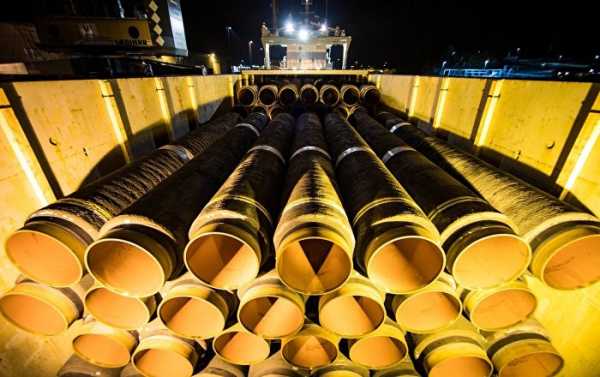
Earlier, Latvian European Parliament lawmaker Sandra Kalniete prepared a resolution to “stop” the Russian-Western European gas pipeline project amid growing US pressure on Europe over the issue.
German Foreign Minister Heiko Maas has reiterated Germany’s support for the Nord Stream 2 project, emphasizing that it was a purely commercial initiative and that Europe would have nothing to gain by rejecting it.
“This is an economic project. It would not benefit anyone if German and European companies were to withdraw,” Maas said, speaking to Neue Osnabrucker Zeitung in an interview published Saturday.
“We have made it clear that Nord Stream 2 can exist only if gas transit through Ukraine is secured beyond 2019. We have wrested this pledge from the Russians. It is clearly in the European interest that Ukraine continues to play a role as a transit country for Russian gas,” Maas added.
Earlier this week, German European Parliament member Manfred Weber asked German and European companies to reconsider their investment into the Nord Stream 2 project following last Sunday’s Kerch Strait incident, which saw Russia detaining three Ukrainian Navy vessels which violated Russia’s maritime borders and escalated the diplomatic spat between Moscow and Kiev.
On Wednesday, German cabinet spokesman Steffen Seibert said that the Kerch Strait incident would not change Germany’s approach to Nord Stream 2.
On Saturday, European Parliament lawmaker Sandra Kalniete announced that she had prepared a formal resolution on the issue, claiming that Nord Stream 2 “reinforces EU dependency on Russian gas supplies, threatens the EU internal market and is not in line with EU energy policy, and therefore needs to be stopped.”
Also this week, the United States, which has been attempting to export its more expensive LNG gas to Europe, called on European countries to reconsider their participation in Nord Stream 2, saying that the project “helps the Russian government” and questioning whether this was “the kind of support that they want to provide the Russian government…at this time.”
Nord Stream 2 is a joint venture between Russia’s Gazprom and five Western European energy concerns, including Germany’s Uniper and Wintershall, France’s Engie, Austria’s OMV, the Dutch-UK Royal Dutch Shell. The $10.9 billion project aims to build a capacity for the delivery of up to 55 billion cubic meters of additional Russian natural gas to Germany via the Baltic Sea, and is expected to become operational by the end of 2019. The project, which has received approval for construction in the territorial and exclusive economic zone waters of Russia, Finland, Sweden, and Germany, has yet to receive Denmark’s agreement. Last month, Nord Stream 2 AG, the construction company building the project, reported that it had already laid about 250 km of pipeline.
Observers have pointed to Nord Stream 2’s importance for European energy security. Recently, Sputnik energy economics observer Dmitri Lekuh pointed out that comparably inexpensive, guaranteed Russian gas supplies to the northern European industrial cluster were crucial to preserving the competitiveness of German industry against its US and Chinese rivals, while accounting for the depletion of European energy supplies and the planned decommissioning of German nuclear power plants.
Sourse: sputniknews.com






